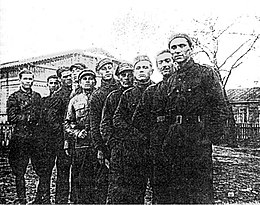This is an old revision of this page, as edited by AnomieBOT (talk | contribs) at 15:40, 8 July 2018 (Rescuing orphaned refs ("IPN09" from rev 849364367)). The present address (URL) is a permanent link to this revision, which may differ significantly from the current revision.
Revision as of 15:40, 8 July 2018 by AnomieBOT (talk | contribs) (Rescuing orphaned refs ("IPN09" from rev 849364367))(diff) ← Previous revision | Latest revision (diff) | Newer revision → (diff)| Naliboki massacre | |
|---|---|
 Naliboki self-defense leaders in a meeting with a Soviet NKVD officer (far left) before being massacred Naliboki self-defense leaders in a meeting with a Soviet NKVD officer (far left) before being massacred | |
| Location | Naliboki German-occupied Poland |
| Date | May 8, 1943 |
| Weapons | Automatic and semi-automatic weapons |
| Deaths | 129 (including children) |
| Victims | Poles |
| Perpetrators | Soviet |
The Naliboki massacre (Template:Lang-pl) was the mass killing of 129 Poles, including women and children, by Soviet partisans on 8 May 1943 in the small town of Naliboki in German-occupied Poland (the town is now in Belarus).
Before the 1939 German-Soviet invasion of Poland, Naliboki was part of Stołpce County, Nowogródek Voivodeship, in eastern Poland.
Background
Before 1939, Naliboki had some 4,000 residents, including several hundred Jews, who were driven out of the town following the German advance during Operation Barbarossa.
Following Operation Barbarossa, Germany's invasion of the Soviet Union, Soviet resistance forces operated in Naliboki Forest, in eastern Poland, behind German lines. Their NKVD leaders were sent in by Central Headquarters of the Partisan Movement in 1942, and the partisans were supplied with materiel via airdrops. The local partisans were recruited from Red Army soldiers of all ethnicities who had been trapped by a German encirclement, and from pro-Soviet Belarusians as well as from Ukrainians. They obtained provisions forcibly from villagers, whom they treated as enemies. The murder of peasants by way of terrorizing them into giving up the provisions began in 1943 when villages such as Kamień, Derewno, Borowikowszczyzna, Dziagwie, Rodziewszczyzna were raided. Naliboki was among the villages raided. Consequently in August 1942, by order of the Germans, the villages formed a self-defense unit, and the village police station was closed.
Some of the members of the self-defense unit were Home Army members who used their self-defense membership as a cover. The Soviet partisans were aware of this, and in March and April 1943 they arranged two meetings with the Polish self-defense leaders. During the talks, the Soviet partisans insisted that the Poles join them, but the Poles refused. However, an agreement was signed with the Poles, represented by Eugeniusz Klimowicz, concerning a truce and joint operations against robbers hiding in the forest. The Soviet partisans violated the truce.
The massacre
On the night of 8–9 May 1943, Soviet partisans raided Naliboki. A few of the Soviet attackers, including a political officer, were killed by the defenders. Polish men were dragged from their homes and shot individually or in small groups. Mass looting followed. Many farmhouses were set on fire. Also killed during the Soviet attack were three Polish women, several teenagers, and a ten-year-old boy. The town's church was set on fire, along with the public school, fire station, and post office. The raid took two to three hours. The Soviet commander reported to the NKVD the killing of 250 people, the capture of weapons, the rounding up of 100 cows and 78 horses, and the destruction of a German garrison. In reality, the number of victims was lower (now estimated at 129); no Germans were present or killed; and only one Belarusian auxiliary policeman happened to be sleeping in the town on the night of the attack.
Polish investigation
On 20 March 2001 an investigation into the Naliboki massacre was launched by Poland's Institute of National Remembrance in Łódź. According to a statement by the IPN, the unit involved was the "Stalin" brigade as well as partisans from the "Dzerzhinsky", "Bolszewik" and "Suvorov" and units. The IPN has been looking at the possible participation of members of the Bielski partisans as one of the possibilities. The IPN has said that there was no supporting documentation for this premise, and according to Polish journalist Piotr Gluchowski witnesses mentioning the Bielskis were merely "parroting what they had read in a book by an avowed anti-Semite". Bielski partisan survivors denied any involvement.
See also
References
- Klimowicz, Mieczyslaw (2008). The Last Day of Naliboki: The Untold Story Behind the Massacre. American Literary Press. ISBN 9781934696262.
- pg. 247
- "Wyborcza.pl". wyborcza.pl. Retrieved 2018-03-05.
- "«Еврейские партизаны» не имели меры в своей необоснованной злости и в грабежах — Інстытут беларускай гісторыі і культуры" (in Russian). inbelhist.org. Retrieved 2017-10-21.
- ^ IPN (November 2013). "Śledztwo w sprawie zbrodni popełnionych przez partyzantów radzieckich na żołnierzach Armii Krajowej i ludności cywilnej na terenie powiatów Stołpce i Wołożyn woj. nowogródzkie (S 17/01/Zk)". Śledztwa w biegu - Zbrodnie komunistyczne. Instytut Pamieci Narodowej. Retrieved 25 January 2014.
- ^ Kazimierz Krajewski. "Ginęli, ratując Żydów" [Dying while Rescuing Jews] (PDF). „Opor”? „Odwet”? Czy po prostu „polityka historyczna”? O Żydach w partyzantce sowieckiej na Kresach II RP. NR 3 (98), March 2009. Warsaw: IPN Bulletin: 99–120. ISSN 1641-9561. Archived from the original (PDF) on 2016-02-22.
{{cite journal}}:|volume=has extra text (help); Unknown parameter|deadurl=ignored (|url-status=suggested) (help) - Geraldine Bereziuk Lowrey (March 5, 2015). "Book Review". The Last Day of Naliboki By Mieczyslaw Klimowicz (American Literary Press, 2009). The Am-Pol Eagle, Cheektowaga, NY.
At the time, Mieczyslaw Klimowicz, the son of Eugeniusz Klimowicz, was in his teens.
- ^ IPN (1 March 2002), Investigation Reports on Koniuchy and Naliboki, Institute of National Memory, retrieved 19 January 2014
- Komunikat dot. śledztwa w sprawie zbrodni popełnionych przez partyzantów sowieckich w latach 1942–1944 na terenie byłego województwa nowogródzkiego, IPN
- Jewish Brothers' Resistance Inspired 'Defiance', NPR, 27 December 2008
- Bielski brothers were heroes, says survivor, Telegraph, David Harrison, 10 Jan 2009
External links
Categories: